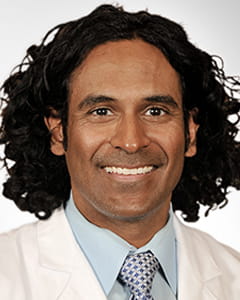Colorectal Cancer Screening Should Begin at Age 45, New Guidelines Say
Colorectal cancer cases among younger adults are rising in the United States. In 2020, 12 percent of those diagnosed with colon cancer were under 50. Colorectal cancer cases have been increasing in younger adults for decades, but the misconception remains that the disease only affects older adults. What is particularly concerning for oncologists is the frequency of very advanced cancers in younger patients.
The U.S. Preventive Services Task Force recently updated guidelines to recommend that colorectal cancer screenings begin at age 45, rather than age 50, and every five to 10 years after. The hope is that by lowering the recommended age to begin screening, growths in the colon and rectum, called polyps, can be detected earlier and removed before they become cancerous.
How Colorectal Cancer Develops
Colorectal cancer occurs in the last part of the gastrointestinal tract, where what we eat becomes solid waste.
Cancers begin as polyps, but they can change over time if left untreated. Once a polyp becomes cancerous, it can spread through the wall of the colon and to other parts of the body.
As with many other cancers, the earlier colon cancer is detected, the easier it is to treat. The prognosis for early-stage colon cancer is far superior to cancers that have spread.
The Dangerous Myth of Colorectal Cancer
The elderly shoulder the greatest burden from colorectal cancer, with nearly 70 percent of cases diagnosed in people older than age 65. But the report from the U.S. Preventative Services Task Force called the increase in cases among younger people “alarming.”
A few reasons younger adults tend to dismiss the early signs of colorectal cancer include embarrassment, assuming their symptoms are due to something less serious or thinking that colon cancer is something only older people experience.
Symptoms of colorectal cancer can include:
● Abdominal pain/cramping
● Bleeding from the rectum
● Blood in the stool
● Changes in the shape/type of stool or the frequency with which you have a bowel movement
● Decreased appetite
● Weight loss
The causes of colorectal cancer are varied. Risk factors include:
● Heavy alcohol consumption
● Eating less fiber and/or more processed foods
● Diets with a high proportion of animal protein, particularly red meat
● Genetics (particularly if a family member has had the disease)
● Obesity
● Smoking
Now that colorectal cancer guidelines recommend screening for adults 45 and older, the testing will be covered by insurance providers, making screening in younger age groups more widespread and saving more lives.
How Doctors Screen for Colorectal Cancer
The new screening recommendations include two types of tests to detect polyps and early signs of colorectal cancer: colonoscopies and stool-based tests.
A colonoscopy is an examination of the colon and rectum using a thin, flexible tube with a camera that allows a gastroenterologist to check for polyps or cancer growing inside the intestinal tract. If a polyp is detected, the doctor will remove it during the colonoscopy procedure for further testing. If cancer is detected, a referral is made to a surgeon for removal.
There are a few stool-based tests to screen for colon cancer, including:
Guaiac-based fecal occult blood test (gFOBT): Used to detect blood in the stool. For this test, you receive a kit from your doctor, which you can take home. You use a stick or brush to obtain a small sample of your stool and return the sample to your doctor or a lab where the stool sample is inspected to look for the presence of blood.
Fecal immunochemical test (FIT): Tests for hidden blood in stool, which may be an early sign of cancer.
FIT-DNA test: Detects altered DNA in the stool. For this test, you’ll be asked to collect an entire bowel movement (rather than just a sample) and send it to a lab where it is tested to detect cancer cells.
Colorectal Screening Saves Lives
According to the American Cancer Society, rates of colorectal cancer in people 50 and older fell during the past 20 years, primarily because more people were getting the recommended screening tests.
When colorectal cancer is detected early and hasn’t yet spread to other parts of the body, it’s easier to treat and has a better prognosis.
With early detection critical for improved patient outcomes and survival rates, it’s essential to get screened as early as you can. If you have a family history of the disease, talk to your doctor, who may want you screened at a younger age and at shorter intervals.
Choose to Stay in Touch
Sign up to receive the latest health news and trends, wellness & prevention tips, and much more from Orlando Health.
Sign Up





